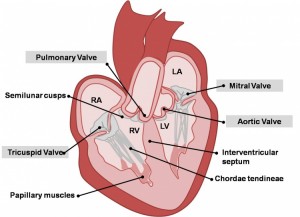News
Archive for March, 2021
What is a Heart Murmur?
by admin on March 10th, 2021
Category: News, Tags:
Hearing your vet announce that “your pet has a heart murmur” can be very daunting. However the significance of a murmur very much depends upon the situation. Just as a fever can be something or nothing, a murmur may be similar – it may be insignificant, but it could also be a symptom of a disease that requires treatment. So, first of all, what is a heart murmur?
Simply put, a murmur is a sound produced by a squirt of blood inside the heart when it pumps. There are many causes of a murmur.
There are three sections in this information sheet:
- Murmurs explained
- FAQs about murmurs
- List of the common causes of murmurs in dogs and cats
1 Murmurs explained
Hearing your vet announce that “your pet has a heart murmur” can be very daunting. However the significance of a murmur very much depends upon the situation. Just as a fever can be something or nothing, a murmur may be similar – it may be insignificant, but it could also be a symptom of a disease that requires treatment. So, first of all, what is a heart murmur?
Simply put, a murmur is a sound produced by a squirt of blood inside the heart when it pumps. There are many causes of a murmur.
There are three sections in this information sheet:
- Murmurs explained
- FAQs about murmurs
- List of the common causes of murmurs in dogs and cats
1 Murmurs explained
Murmurs due to regurgitation:
Each of the four valves in the heart act as non-return valves, permitting blood flow in one direction (forwards). If a valve becomes faulty and no longer prevents backflow, then there is a resultant backward squirt of blood through the gaps in the valve with each heartbeat. This backward squirt of flow through an incompetent valve results in an abnormal heart sound called a heart murmur. A murmur thus sounds like a ‘squirting’ or ‘gushing’ sound during each heartbeat. The most common cause of an incompetent valve in older dogs is Mitral Valve Disease, or Endocardiosis, as it is also known.
Murmurs due to narrowed valves:
If a heart valve is abnormally narrowed, usually due to a congenital defect (eg. Aortic Stenosis or Pulmonic Stenosis) then blood flow pumped out through the narrowed valve is pinched, resulting in an abnormal squirt of flow, ie. a murmur. This can be likened to putting a thumb over the end of a hose pipe to make the water squirt, rather than pour.
Murmurs due to ‘holes in the heart’:
A murmur can also occur through a hole in the heart – the murmur is caused by the squirt of blood going through the hole. A hole between the left ventricle and right ventricle results in a squirt of blood being pushed through the hole when the heart ventricles pump (this is called a Ventricular Septal Defect (VSD)). A hole between the aorta and pulmonary artery (the two major arteries leaving the heart) results in blood squirting through the hole (this is called a Patent Ductus Arteriosus (PDA)).
Puppy murmurs:
In puppies less than 6 months of age, in addition to murmurs produced by congenital defects, puppies can have innocent or benign murmurs – often called a puppy murmur. These occur due the fast flow of blood in such a small heart. As the puppy and its heart grow and mature, then the murmur gradually disappears. It is virtually impossible for a vet to discern the difference between a puppy murmur and a congenital defect. If a murmur persists beyond 6 months of age, it is more likely to be a congenital defect.
Murmurs associated with illness:
A murmur can also be produced when a dog is anaemic and the blood thin. In this situation thinner blood (less viscous) results in faster speed of flow and thus a murmur. A similar situation can occur when a dog is ill for other reasons, such as during a fever.
2 FAQs about heart murmurs in cats and dogs
What is the significance of a murmur?
This depends upon what the cause of the murmur is from the list above, whether the defect causing the murmur is classified as: mild, moderate or severe, and whether it is resulting in heart enlargement or not.
Is the loudness of a murmur significant?
Not always. It depends upon what the cause of the murmur is from the list above. Some murmurs are innocent and of no clinical significance, whereas others are associated with defects. Many defects can be mild and have no effect on the heart and animals can live a full and normal life with them, whereas other defects affect the heart and may need some form of treatment.
Do all these murmurs sound different for each defect?
No, in fact they virtually all sound the same. The squirt (murmur) is heard when the heart beats, so the murmur is brief. The only defect that produces a slightly different sound is a PDA – the murmur is continuous rather than intermittent or brief.
Listening with a stethoscope is not easy and many vets find this difficult. As humans, we all have differing skills and abilities, so there is a lot of variation. It is likely that a veterinary cardiologist will hear murmurs better, because they have had a lot more practice and experience, as well as additional training.
What is the best way to diagnose a murmur?
Nearly always, an ultrasound scan (echocardiography) is the best way to diagnose a murmur. But sometimes additional tests are also required, such as chest x-rays, ECG or blood tests. Echocardiography is a difficult and skilled examination that is best performed by an experienced clinician.
3 List of the common causes of murmurs in dogs and cats
Defects can be congenital, meaning an animal has been born with the defect. Or there can be changes in the heart that develop in adult life, for example due to ageing degeneration of a valve.
Murmur due to Mitral Valve Regurgitation (valve not closing completely)
- Mitral Valve Disease (MVD) is the most common cause of a murmur in adult dogs in older age
- Mitral Valve Dysplasia is a congenital defect of the valve
- Mitral Valve Regurgitation can occur secondary to heart enlargement of other causes in dogs
- Mitral Valve Regurgitation can be secondary to cardiomyopathy in cats
Murmur due to Aortic Valve Stenosis (narrowing of the valve)
- Subaortic Stenosis and Valvular Aortic Stenosis is a congenital defect of the valve
- Hypertrophic Cardiomyopathy in cats, often causes ‘Subaortic- like Stenosis’
Murmur due to Tricuspid Valve Regurgitation (valve not closing completely)
- Tricuspid Valve Disease occurs in adult dogs in older age, most will also have MVD
- Tricuspid Valve Dysplasia is a congenital defect of the valve
- Tricuspid Valve Regurgitation can occur secondary to Pulmonary Hypertension
- Tricuspid Valve Regurgitation can be secondary to heart enlargement of other causes
- Tricuspid Valve Regurgitation, when mild, can be seen in some normal dogs
Murmur due to Pulmonic Valve Stenosis (narrowing of the valve)
- Valvular Pulmonic Stenosis is a congenital defect of the valve
Murmurs associated with holes in the heart
- Patent Ductus Arteriosus is a congenital defect resulting in abnormal flow between the aorta and pulmonary artery
- Ventricular Septal Defect is a congenital defect in which there is a hole between the two ventricles
Innocent murmurs
These are murmurs due to abnormal flow within the heart and not due to a defect in the heart, ie. there is no congenital defect, or degenerative disease. There are a number of causes, these are just some examples:
- Puppy murmurs are innocent murmurs that usually disappear by 4-6 months of age
- Anaemic murmurs are due to the blood being thin
- Fever murmurs are due to turbulence in blood flow
- Flow murmurs are seen in some athletically fit dogs, ie. a murmur with no defect present
Pet of the month – March 2021
by admin on March 10th, 2021
Category: Pet of the Month, Tags:
Pet of the month this March is a charming 9 year old cross breed called Fred.
He was initially presented for veterinary attention when he was noted scooting his bottom indoors. A large mass was identified at the site of Fred’s right anal gland which was diagnosed, on fine needle aspirate, to be a malignant tumour. Unfortunately the mass was very closely apposed to the anus and rectum which raised concerns regarding it’s safe removal, without compromising normal bowel function. Referral to a specialist was recommended. A CT scan revealed no evidence of secondary spread so Fred underwent surgery. We are delighted to report that Fred made an excellent recovery and is now in fine form, back in good health.



